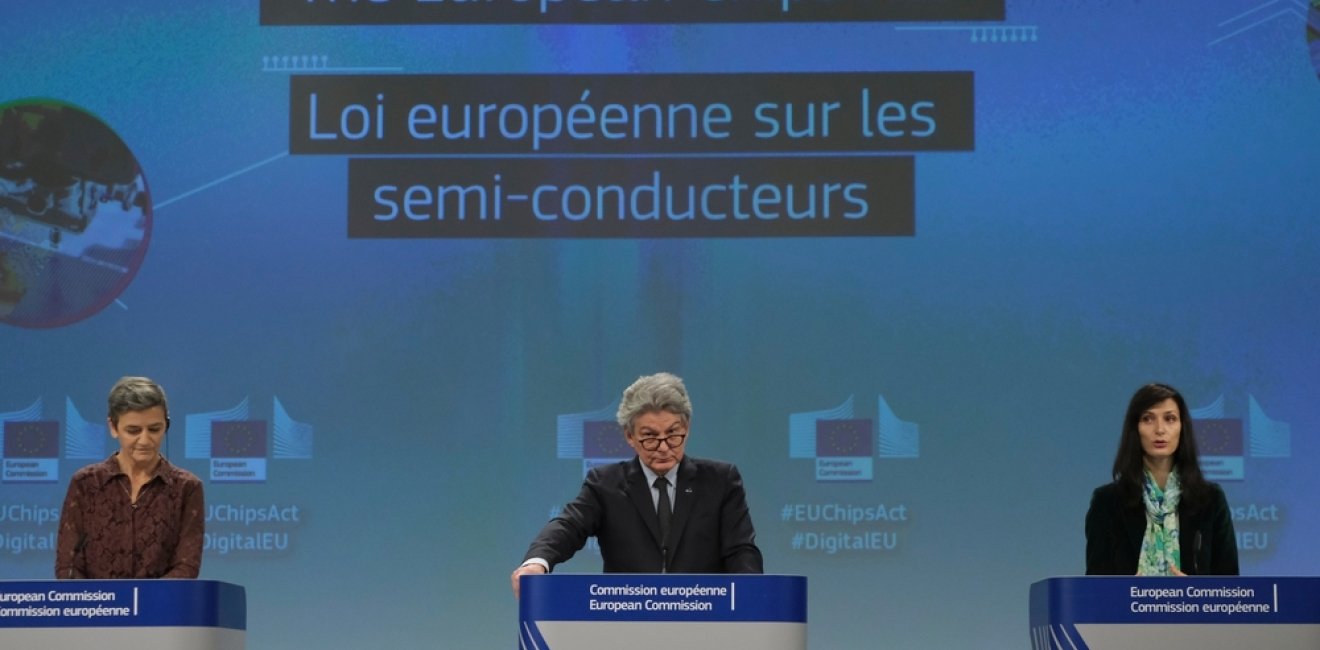In the last decade, the world began to understand the necessity of the semiconductor industry. According to a survey conducted by the EU, in 2020 a trillion microchips were produced. Despite high production, 2020 saw a large chip shortage, leading to sharp increases in the price of electronic goods. On July 25th, 2023, the EU Council approved the European Chips Act. Fitting into a larger campaign of digital innovation in Europe, the European Chips Act will facilitate an increase in chip production, aiming to grow the European market share of microprocessors in global supply chains. This legislation is a step in the right direction toward alleviating supply issues that have plagued the European economy in recent years while also promoting economic growth for the Union.
A substantial change in direction
Despite having a large market for electronic devices, the EU only holds a minority of the global market share on semiconductors. Lawmakers in the EU have expressed concerns surrounding the mostly import-based market. During her State of the Union address in 2021, Commissioner Ursula von der Leyen emphasized that Europe has to become a leader in the semiconductor industry, as a matter of “technological sovereignty”.
The EU Chips Act has clear-cut and ambitious goals for the next decade–to increase the EU's global market share in chip production from 10% to 20%. Estimates show the chips market is set to double by 2030–simply doubling the EU’s current production will not meet demand in the next decade. The EU has said it will mobilize 43 billion euros from “policy-driven” sources, essentially subsidizing the industry, till 2030. By assisting with the cost burden, the EU hopes to ease the high financial barrier to entry, making the industry self-sustaining by the end of the decade. The Chips Act will also help aid small and medium enterprises (SMEs) by lowering high costs of entry.
The act lays out different strategies on a short, and long-term basis. In the short term, the plan hopes to build more semiconductor plants across the EU through financial incentives for tech companies. Prior to the act being adopted, several tech companies had already begun looking into expanding production into the European market. Intel announced in June of 2023 that it was building a new ‘mega’ factory in Magdeburg, Germany, while simultaneously establishing R&D divisions in France. The proposed expansion is about 33 billion euros. The European Chips Act will encourage other companies to examine the EU as a viable option for manufacturing expansion by offering subsidized and fast-track options for development. New European factories will also create more jobs, supporting local communities and growing the regional economy. The Intel plant in Magdeburg alone is estimated to create 3,000 jobs for the plant and 7,000 for the construction efforts; thus creating more work opportunities for the local community. The effectiveness of the plant is yet to be seen, as similar projects in Arizona have faced issues related to labor shortages, however, the EU hopes to proactively solve this by investing in technical training, creating ‘competence centers’ designed to teach necessary skills. Additionally, Intel has reiterated its commitment to invest in Europe.
The European Chips Act will encourage other companies to examine the EU as a viable option for manufacturing expansion by offering subsidized and fast-track options for development. New European factories will also create more jobs, supporting local communities and growing the regional economy.
While building more factories will increase chip production, the Chips Act also details plans to keep the EU competitive in the long run through innovation. This will primarily be achieved with investment into innovation centers and start-ups facilitated by both private and public funds. The EU already has programs in place to support small entrepreneurs and inventors. The Digital Europe Program and Horizon Europe will receive 15 billion Euros for semiconductor-related R&D. Although currently not a leader in the global production of chips, the EU is a world leader in photolithography machines, the essential component in printing chips. ASML, a Dutch company, has welcomed the act by expressing “strong support” for the legislation. The EU hopes to use targeted development funding to create more cutting-edge technologies similar to the ASML’s EUV lithography machines, one of the most advanced printers in the world. By fostering innovation the EU aims to hold a competitive advantage, even if it is not the largest producer. In addition to sponsoring more technological development, the programs will also promote the education of valuable skills needed for production
By fostering innovation the EU aims to hold a competitive advantage, even if it is not the largest producer. In addition to sponsoring more technological development, the programs will also promote the education of valuable skills needed for production. A key factor in the future will be having a large talent pool to maintain production targets.
Effects on the Market
While many have hailed the EU’s legislation as a ‘response’ to the US CHIPS Act, in reality, both pieces of legislation are efforts to reduce dependency on Taiwan, South Korea, and China. Recent data shows that 87% of the world's semiconductors were produced in those three countries, with Taiwan making up more than 60% of the market. To the EU and the US, a clear risk is posed by having a strong reliance on the region, especially considering the increased tensions in the Indo-Pacific region. When examining those factors, the European Chips Act may be productive to both the EU and the US, creating less reliance on Asian manufacturers in the future by stimulating healthy economic competition. However, a concern is that individual subsidies will create a ‘race to the bottom’. In fact, during the May Trade and Technology Council (TTC) meeting, the White House announced bilateral “formal exchanges of information on public support granted to the semiconductor sector”. As a means to avoid these issues, the EU and US are attempting to communicate and create a joint approach. As the United States and EU continue cooperation with their TTC meetings, this framework will in all likelihood be expanded upon. In the long run, increasing local production will not only shore up supply chain security but will also decrease the costs of electronic goods. This will in turn have a synergistic effect on the rest of the market.
The EU economic strategy for the next decade relies heavily on technological integration and innovation. During her tenure as President of the EU Commission, Ursula von der Leyen has seen the implementation of multiple policies regarding data, R&D, and now microchip production. By increasing its production capacity of semiconductors and chips, the EU can open up new industries and possibilities for economic growth. The European Chips Act will help to make the EU a more capable partner in the tech industry on the global stage, ready to meet the demands of the future.
Author


Global Europe Program
The Global Europe Program is focused on Europe’s capabilities, and how it engages on critical global issues. We investigate European approaches to critical global issues. We examine Europe’s relations with Russia and Eurasia, China and the Indo-Pacific, the Middle East and Africa. Our initiatives include “Ukraine in Europe”—an examination of what it will take to make Ukraine’s European future a reality. But we also examine the role of NATO, the European Union and the OSCE, Europe’s energy security, transatlantic trade disputes, and challenges to democracy. The Global Europe Program’s staff, scholars-in-residence, and Global Fellows participate in seminars, policy study groups, and international conferences to provide analytical recommendations to policy makers and the media. Read more





